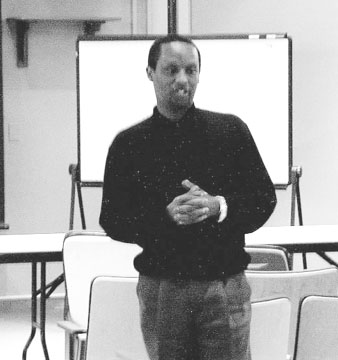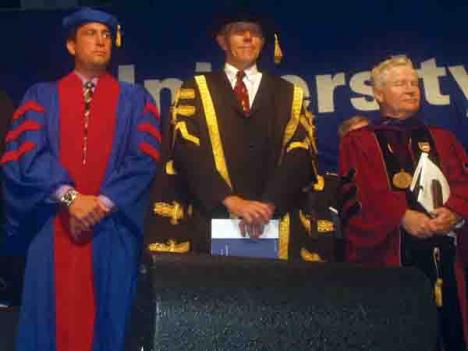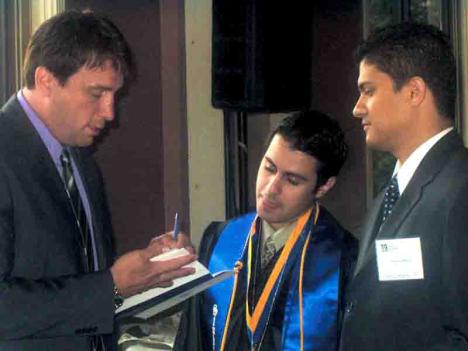The Face of Tragedy

Rwandan Jean-Marie Kashima, a friend of Nick Hughes who directed the film 100 Days. – Photos by Kory Vergets
April 30, 2003
Helping to kick off an educational outreach program last Tuesday, the William Joiner Center for the Study of War and Social Consequences screened the film “100 Days” at the Healey library. “100 Days” is a feature film about the genocide that took place in Rwanda in 1994. Doris Jaffe, PR officer for the film explains, “We go to colleges, churches, community centers to show this film and help the world understand what took place.” With Jaffe was Rwandan Jean-Marie Kashima, a friend of director Nick Hughes, brought over by the Joiner center as part of their outreach program to survivors and veterans of world conflicts.
“100 Days” is a raw and touching dramatic rendering of the genocide in Rwanda, when in 1994 one ethnic group, the Hutus, rose up and slaughtered another, the Tutsi. It was the swiftest and most brutal genocide of the twentieth century. Between 600,000 and 1 million people were hacked and beaten to death with clubs and machetes in 100 days.
The film was screened for the small crowd of somber observers as Kashima, who is a Tutsi, explained that “100 Days” was “A fine, accomplished film with non-professional actors. All the people in the film, for them this was real.” “100 Days” was written and directed by Nick Hughes, a BBC cameraman who was on hand in Rwanda for the genocide, and whose “soul was killed” as Kashima puts it, by the sights he witnessed there.
Surprisingly, the film was not as soul-crushingly depressing as one might have expected. Hughes deliberately chooses a bright, slightly washed out, grainy cast that accentuates the lush jungle look of Rwanda by understating it. It grants a somber feel to the barren, poor townships and at night, in the Catholic Church that proves a killing ground, the film resembles nothing so much as the original “Dracula,” sinister and somehow pathetic. Other aspects of the film catch at the heart as well; the total lack of acting ability is charming in some places, and grating in others. In one clunky scene, our main characters Jean-Pierre and Josette and us are awkwardly running through a forest and collapsing on the grass to do the eternal lover’s dance. Foreshadowing the terror that’s coming, the running figures strain against the dappled shadows of the forest almost in fear, and we hear Josette express her reluctance to have risky sex and “have a baby like all my stupid friends,” setting the scene for her later rape and pregnancy. Our young friends are trying to be casual and carefree, but they are just not professionals, and the very fact that these two had in all likelihood been through the horrors they inexpertly try to portend works poorly for the drama as a whole.
The film improves markedly from there as events grower larger than just two actors, including families and relatives, and expanding concentrically to culminate in an apocalyptic slaughter at the church. Hughes has made a sage and kind decision not to make the violence blatant or gory. He preserves the feeling and the sincerity of his film by not playing up the blood and guts, which naturally would have been easy to do, but in tradition of great films, he simply shows the necessary, and not the prurient.
In many places the film is strongly reminiscent of Kurosawa, the seminal Japanese auteur. Like Kurosawa, Hughes’ camera is very still and calm, no matter what the action is, and that helps make the landscape an actor. Like Kurosawa, whose films also dealt with terrible violence, Hughes sees no need to glorify or interpret human action. He simply shows it, stark and brief, and forces nothing upon the viewer but the truth of what he is showing us.
The truth is of course what makes us forgive the film’s flaws, its clumsy script and unpolished acting. The film is likely as close as any of us will ever get to knowing with certainty what happened and how it felt to be trapped, with the wrong kind of human beings, in that bloody little country for a bloody 100 days.






















































